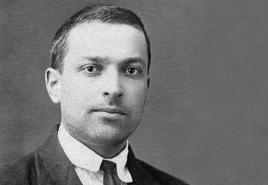The most famous psychologists of modernity. Famous psychologists
07/24/2019 at 12:03 pm · VeraschegoLeva. · 4 100
The most famous psychologists whose works turned the idea of \u200b\u200ba person
Until now, one of the most mysterious medical science disciplines remains. By the way, it is often confused with the younger sister - psychiatry. This is incorrect, because psychiatry is a discipline of practical, therapeutic.
Psychologists are engaged in this science. You can argue about which of them has a greater or less contribution to science. But fame is not limited to scientific prizes.
Let's get acquainted with the life and features of the work of the most famous psychologists of Russia and the world.
10. Vladimir Lvovich Levi
In 1938, in the family of engineers (Metallurg Father, Mother Chemist), a son was born, who was to disturb the folded dynasty and become a luminary of medical science - as well as a member of the Writers' Union!
Vladimir Lvovich Levi. He worked as a psychiatrist in the hospital name; Researcher at the Institute of Psychiatry. Among other things, an important contribution to the creation of a "confidence phone" is made.
He pays great importance to popularizing scientific knowledge and spreading advanced ideas. Back in 1967, his debut work "Hunt for the thought: notes of the psychiatrist" got widespread.
9. Lion Semenovich Vygotsky

"Founder of the Marxist tradition of the study of the psyche" Today it sounds at least, doubtful. But from a scientific point of view, this is a completely correct definition. Marxism is not only (and not so much) the political course, as a complex of scientific approaches and traditions in the knowledge of the world.
Lion Semenovich Professional Born in Russia (1896), lived all his life and worked in the USSR. The flourishing of his scientific career came to the difficult period of the formation of Soviet power.
In scientific activities, there was also shocks related to the search for a new, "Soviet" scientific methodology. It was profitable to show that following "new methods" is not just possible, but also leads to rethinking science and new scientific discoveries.
In particular, his studies convincingly showed that a direct adherence in the study of the psychology of the child direct and narrow views of the fashionable then Freud is influential and leads psychology to a dead end. And this approach is reflected in all his work - the most famous of which "Thinking and speech"; "Psychology of Art"; "The problem of the cultural development of the child".
8. Dale Carnegie

Can hardly be called Dale Carnegie "Psychologist" or "Psychiatrist". Nevertheless, we all know his works "How to conquer friends and influence people"; "How to stop worrying and start living". But this is only an accessible to the audit of his creativity.
Born in 1888 in a poor American family, Dale Carnegie from early childhood has learned the farmers life. But he was always damned and oratory.
Early engaged in small trade, Dale was able to accumulate enough money in order to completely devote himself to his beloved business - teaching.
Actually, his numerous works are devoted, first of all, the art of finding contact with a variety of and is not always a trustful public.
7. Alois Alzheimer

Probably term "Alzheimer's disease" At all on hearing. The name of the famous neurologist and psychiatrist born in 1864 in Germany was perfected in a dozen symptoms and pathologies of the nervous system. But this is his celebrity "For the general public".
Alois Alzheimer All my life was engaged in research and scientific activities. Numerous scientific publications were combined into a fundamental multi-volume "Histological and histopathological studies of a gray brain substance".
But a significant part of creativity remains accessible only by the deputy specialist in the form of publications in specialized literature.
6. Ernst Henry Weber

Born in Germany (1795), Ernst Henry Weber Not quite a "psychiatrist". His main scientific interests were comparative anatomy and microscopic studies.
Most of his scientific papers are known in the form of publications in specialized journals - and they greatly advanced science.
Nevertheless, his studies of sense organs led to the development of Psychophysiology science. In the office of each neurologist there Zirkul Weberallowing to measure skin sensitivity.
"Weber-Fehener Law" He became so none that this term is often used, not even knowing what he means. And he binds mental sensations with the actual force of external influence - and it became the basis of "practical psychophysics".
5. Melanie Klein

"Children's Psychoanalysis", "Game therapy" - Overall merit Melanie Klein. Born in Austria (1882), known to the world as a British psychologist.
The personal life of Melanie was not too smooth. Her family life did not work out - relations with children were constantly led to quarrels.
Moreover, her daughter (also the famous psychoanalyst) argues that the eldest of sons after one of the scandals committed suicide.
Probably, this tragedy and pushed melanie to as science. Already having his medical practice, she was impressed with familiarity with Freud.
Published in 1919 "The influence of sexual education and abandonment of authority on the intellectual development of the child" Fully based on the ideas of Freud and personal family observations.
Latest "Development of one child"; "Children's psychoanalysis"; "Envy and gratitude" became classic popular works.
4. Adler Alfred

Primarily Adler Alfred (born in 1870 in Austria) is known as founder "Individual psychology".
Being at first a hot fan and a supporter of Sigmund Freud, in 1907 Adler managed to raise himself with a recognized maestro psychology.
In his book "Investigation of the inferiority of organs" Adler defeated his views convincingly that the psyche was determined not only by child sexuality, but should be investigated in a complex with real circumstances.
Published in 1912. "On the nervous character" It fully reveals the basics of what was subsequently called "individual psychology". Its further works only fully reveal these views and are directed to their popularization in the masses.
Transfers of work are quite available to the domestic reader. "Science live"; "Individual psychology as a path to the knowledge and self-knowledge of a person"; "Technique of treatment".
3. Victor Emil Frank

Born in Austria (1905) Victor Emil Franc From the very beginning planned to devote himself to psychology and psychiatry. While still a student, Francan paid close attention to psychological assistance in crisis situations. By the mid-20s, this problem was as never relevant in Austria and Germany, experiencing the stage of the deepest economic decline.
It was happening to be in a more gravily situation - in 1942, the whole family of Frankl was arrested and sent to the concentration camp. And here his abilities were very by the way. Together with other prisoners, he helped people overcome horror and despair.
After liberation in 1945, Viktor Francan outlined his views on crisis psychological assistance in the book "To say the life of" yes. " Psychologist in the concentration camp. And this work immediately made it world famous.
2. Abraham Harold Oil

Many outstanding scientists came out of quite "landed" families of artisans or merchants. So in 1908, in a modest American family, Bondarey was born Abraham Harold Maslow. By the middle of the XX century, his research in the field of psychology will shook not only medicine, but also the economy.
The first scientific work of a talented young man immediately opened the doors of the best laboratories. But she treated little to man - " The relationship of sexuality and social behavior at primates " It was biological labor.
Apparently, the difficulties of living in the poor family of emigrants and their own life difficulties drew the attention of the young scientist towards psychiatry - and, at the same time, the economy!
Today, the principle of interconnection of needs, social circumstances and behavior even schoolchildren is known as "Pyramid Oil".
1. Sigmund Freud

Born in 1856 in Austria, Sigmund Freud First of all, known to the general public as the author of the sensational scientific papers. Not only specialists, but also the public is well known for his early work "Interpretation of dreams." "Psychopathology of everyday life" With cold clarity makes thinking about the usual problems.
Perhaps the success of National Socialism as a social movement was a considerable influence "Psychology of the masses and analysis of the human" I "".
It is much more important not for his scandalousness, but shocking scientific ideas. For experts (psychologists and psychiatrists), a real breakthrough in the science of human knowledge was the presented model of the psyche "It is - I'm over-I".
The public was terrible to be terrible (and scientifically justified) the connection of the psyche with sexuality. Up to the fact that the mention of such communication itself is called "Freudism".
Open any newspaper or magazine, and you will find the terms proposed by Sigmund Freud. Sublimation, projection, transfer, protection, complexes, neurosis, hysteria, stress, psychological injuries and crises, etc. - All these words firmly entered our lives. And also firmly included the books of Freud and other outstanding psychologists. We offer you a list of the best - those that have changed our reality. Save yourself to not lose!
Eric Bern - author of the famous concept of scenic programming and game theory. They are based on a transactional analysis, which is now studying around the world. Bern is confident that the life of every person is programmed to the five-year-old age, and we all play with each other to the game, using three roles: an adult, parent and child. Read more about this popular worldwide concepts, read in the Bern Bern "" review, presented in the library of CHAKCARTKO.
Edward de Bono, a British psychologist, developed a method, learning effectively to think. Six hats are six different ways of thinking. De Bono offers to "try" every headpiece to learn how to think in different ways, depending on the situation. A red hat is emotions, black - criticism, yellow - optimism, green - creativity, blue - management of thoughts, and white - facts and numbers. You can read in the library of CHAKCARTKO.
3. Alfred Adler. Understand the nature of man
Alfred Adler is one of the most famous students of Sigmund Freud. Created its concept of an individual (or individual) psychology. Adler wrote that the actions of a person affects not only the past (as Freud taught), but also the future, or rather the goal that a person wants to achieve in the future. And on the basis of this goal, he converts his past and present. In other words, only knowing the goal, we can understand why a person came so, and not otherwise. Take, for example, image with the theater: Only the last act we understand the actions of the heroes that they made in the first act. On the general law of the development of the person, proposed by Adler, you can read in the article: "".
Doctor of Medicine, Psychiatrist and Psychoanalyst Norman Doyz, devoted his brain plastic research. In his main work, he makes a revolutionary statement: our brain is able to change its own structure and work due to the thoughts and actions of man. Dyager tells about the latest discoveries, proving that the human brain is plastic, and therefore it is capable of self-change. The book presents stories about scientists, doctors and patients who were able to achieve amazing transformations. Those who had serious problems, managed without operations and tablets to cure brain disease, considered incurable. Well, those who have no particular problems could significantly improve their brain. Read more, presented in the library of CHAKCARTKO.
Susan Vainshenk is a famous American psychologist who specializes in behavioral psychology. It is called "Lady Brain", because it studies the latest achievements in the field of neurology and human brain and applies knowledge gained in business and everyday life. Susan talks about the basic laws of the psyche. In his best-selling, she highlights 7 main motivators of human behavior that affect our lives. Read more about this in a review on the book "", presented in the library of CHAKCARTKO.
6. Eric Erickson. Childhood and society
Eric Erickson is an outstanding psychologist who detailed and supplemented the famous age periodization Sigmund Freud. Periodization of the human life proposed by Erickson consists of 8 stages, each of which ends with a crisis. This crisis man must pass correctly. If not passes, then it (crisis) is added to the load in the next period. You can read about the important age periods of the life of adults in the article: ""
The famous book of the famous American psychologist Robert Caldini. She became classic in social psychology. "" Recommend the best scientists of the world as an interpersonal relationship benefit and conflictology. The review on this book is presented in the library of CHAKCARTKO.
8. Hans Aizenk. Personal measurements
Hans Aizenk is a British psychologist, one of the leaders of the biological direction in psychology, the creator of the factor theory of personality. The most famous as the author of the popular test to the level of intelligence is IQ.
The psychologist Daniel Gowman completely changed our idea of \u200b\u200bleadership, stating that the leader "Emotional Intellect" (EQ) is more important than IQ. Emotional intelligence (EQ) is the ability to identify and understand emotions, both own and others, as well as the ability to use this knowledge to manage their behavior and relationships with people. A leader that does not have an emotional intelligence may have first-class training, have a sharp mind and infinitely generate new ideas, but he will still lose the leader who can manage emotions. Why this is happening, you can read in a review on the book of Gullman "" presented in the bookCartko library.
The famous sociologist Malcolm Gladwell presented a number of curious studies on intuition. He is sure that the intuition has each of us, and it is worth listening to it. Our unconscious without our participation processes huge data arrays and on a sowing gives the most faithful solution that we can only not miss and use it difficult for yourself. However, intuition is easy to move the lack of time to make a decision, the state of stress, as well as an attempt to describe their thoughts and actions. Overview of the Gladwell Bestseller "" is in the library of CHAKCARTKO.
11. Victor Frank. Will to meaning
Victor Frankon is a world famous Austrian psychologist and a psychiatrist, a student of Alfred Adler and the founder of the logotherapy. Logotherapy (from the Greek "Logos" - the word and "TERAPIA" - care, care, treatment) - this direction in psychotherapy, which emerged on the basis of the conclusions that Frankl did, being concluded by the concentration camps. This therapy for finding meaning is the way that helps a person to find meaning in any circumstances of his life, including those in such extreme as suffering. And here it is very important to understand the following: to find this meaning, Frankl offers to explore not depth of personality(as Freud believed), And its heights.This is a very serious accent difference. Franklis psychologists mostly tried to help people exploring the depths of their subconscious, and Franklists insist on the complete disclosure of the human potential, on the study of his heights. Thus, he does the accent, saying figuratively, on the spire of the building (height), and not on its basement (depth).
12. Sigmund Freud. Interpretation of dreams
13. Anna Freud. Psychology I and Protective Mechanisms
Anna Freud is the youngest daughter of the founder of psychoanalysis Sigmund Freud. He founded a new direction in psychology - ego-psychology. The main scientific merit is to develop the theory of human protective mechanisms. Anna also advanced significantly in the study of the nature of aggression, but still the most significant contribution to the psychology was the creation of children's psychology and child psychoanalysis.
14. Nancy McVilliams. Psychoanalytic diagnostics
This book is the Bible of Modern Psychoanalysis. The American psychoanalyst Nancy McVilliams writes that we all are to some extent irrational, and therefore, about each person you need to answer two main questions: "How much is psycho?" And "What is specifically?" The first question is allowed to answer three levels of the psyche (details in the article: ""), and on the second - types of character (narcissistic, schizoid, depressive, paranoid, hysterical, etc.), in detail the studied Nancy McVilliams and described in the book " Psychoanalytic diagnostics. "
15. Karl Jung. Archetype and symbol
Karl Jung - the second famous student Sigmund Freud (we have already told about Alfred Adler). Jung believed that the unconscious is not only the most lowest in man, but also the highest, for example, creativity. The unconscious thinks symbols. Jung introduces the concept of a collective unconscious, with which a person is born, it is all the same. When a person appears on the light, it is already filled with ancient images, archetypes. They go from generation to generation. Archetypes affect everything that happens to man.
16. Abraham Oil. Long limits of human psyche
Martin Seligman is an outstanding American psychologist, the founder of positive psychology. The worldwide fame was brought by a study of the phenomenon of learned helplessness, that is, passivity in the face of allegedly unreasonable trouble. Seligman proved that at the heart of helplessness and its extreme manifestation - depression - lies pessimism. A psychologist introduces us with his two main concepts: the theory of learned helplessness and the idea of \u200b\u200bthe style of explanation. They are closely connected. The first explains why we become pessimists, and the second - how to change the style of thinking to turn out of the pessimist in an optimist. Seligman Book Overview "" is presented in the library of CHAKCARTKO.
Interest in science about the soul, this is exactly what the word "psychology" translates, in mankind arose many centuries ago. And so far he does not fade, but on the contrary, it flares up with a new force. At the same time, for a long time, famous psychologists have repeatedly changed, developed and complemented the scientific thought about the inner world of man. For many centuries, they have written a huge number of monographs, articles, books on the topic of this topic. And of course, famous psychologists, exploring the nuances and the subtleties of science about the soul, made incredible discoveries in it, which are of great practical importance and on days today. Families such as Freud, Maslow, Vygotsky, Ovcharenko, are known all over the world. These famous psychologists have become real innovators in the investigated area. For them, science about the soul was an integral part of their lives. Who are they and thanks to what scientific achievements became famous? Consider this question more.
Sigmund Freud
For many, the most famous psychologist is he who is. His revolutionary theory is known to almost everyone.
Sigmund Freud appeared in 1856 in the Austro-Hungarian town of Freiberg. This man has become a real expert in neurology. His main merit is that he developed the doctrine, which was based on a psychoanalytic school. It was the famous psychologist Freud that put forward the idea that the cause of any pathology of the nervous system is a complex of conscious and unconscious processes that significantly affect each other. It was a real breakthrough in science.
Abraham Harold Maslow
The category "Famous psychologists" is undoubtedly impossible to submit without this talented scientist. He was born in 1908 in American New York. Abraham Masu created the theory in its monographs you can meet such a thing as the "Pyramid of Maslow". It is represented by special diagrams that personify elementary human needs. In economic science, the specified pyramid found the wider application.
Melanie Klein
In the category "Famous Children's Psychologist", her person takes away from the last place. Melanie Klein was born in 1882 in the Austrian capital. She always remembered childhood with nostalgia, which were filled with happiness and joy. Interest in science about the soul in Melanie woke up after she twice experienced psychoanalysis.

Subsequently, Klein will write valuable scientific monographs dedicated to aspects of children's psychoanalysis. And despite the fact that melanie theory will go against the Freud doctrine of children's analysis, it will be able to prove that a simple children's game can open many secrets of the child's psyche.
Victor Emil Franc
The famous psychologists of the world are also a scientist for the name Frankl. He was born in 1905 in the capital of Austria. He became famous for unique discoveries in the field of not only psychology, but also philosophy. The Third Vienna School of Psychotherapy earned the efforts of Frank. He is the author of the monograph "Man in search of meaning." And it is this scientific work that is the basis of the transformation of the innovative method of psychotherapy, which is more known as logoratera. What is his meaning? Everything is simple. A person throughout its existence is trying to solve the problem of finding the meaning of life.
Adler Alfred
This person also belongs to the scientific luminais, which left a deep mark in psychology. He was born in the Austrian fantasy in 1870. Noteworthy is the fact that Alfred did not become a follower of Freud. He deliberately lost membership in psychoanalytic society. The scientist swallowed around him a private team of like-minded people called "Association of Individual Psychology". In 1912, he publishes the monograph "On the nervous character".

Soon he initiates the creation of the "Journal of Individual Psychology". When the authorities captured the Nazis, he stopped scientific activities. In 1938, the Alfred clinic was closed. One way or another, but he was the only expert in the field of psychology, which defended the idea that the main component of the development of the personality is the desire to preserve and develop their own uniqueness and individuality.
The scientist believed that the lifestyle of a person directly affects the quality of experience that he will gain in old age. This experience is firmly interrelated with the feeling of collectivism, one of the three congenital unconscious feelings belonging to the "I" structure. The design of the style of life is based on a sense of collectivism, but it is far from always subject to development and can remain in the infancy. In the latter case, quarrels and conflict situations may arise. The scientist emphasized that if a person can find a common language with others, he does not threaten a neurasthenik, and he rarely begun on wild and
Blush Wolfovna Zeigarnik
This is also a peace scientist. The famous woman-psychologist Blush Wulfovna Zeigarnik was born in 1900 in the Lithuanian town of Pren. She studied in such famous psychology specialists as E. Shprovger, K. Goldstein. Zeigarnik shared the scientific views set out in Gestalt Psychology. Opponents of this theory have repeatedly tried to dissuade Blumes Wolfovna attend Levin's classes, but she remained adamant. The woman became famous for the fact that he was silent a unique pattern, which was subsequently called the name "The Effect of Zeigarnik".

The meaning is simple. The female psychologist has delivered a simple experience. She gathered a certain number of people and asked them for a specific time interval to solve this or that task. As a result of the Vulfovna Blum experiments, it came to the conclusion that the person remembers the unfinished actions much better than the finished.
Akop Pogmyovich Nazareyan
It is impossible to overestimate this scientist in the field of psychology of mass behavior and in the field of cultural anthropology. Akop Nazareyan is a native of the city of Baku. A scientist was born in 1948. Over the years of serving Science, he wrote a huge number of monographs, where he explored the problems of the theory of society.

Lev Semenovich Vygotsky
He is deservedly called Mozart Psychology, although the sake of fairness should be noted that he initially studied absolutely other areas of knowledge. He entered the medical faculty, then transferred to the legal. And even showed at least good interest in the literature. Left a scientist and a large track in science about the soul. Born in 1896 in the Belarusian town Orsha. This scientist can be safely ranked in the list called "Famous Psychologists of Russia". Why? Yes, first of all, because it is the author of cultural and historical theory in psychology. Back in 1924, Vygotsky in his work critical responded to reflexology. In mature years, he began to in-depth studying questions of speech and thinking and created research work on this topic. In it, Lev Semenovich proved that the processes of thinking and saying thoughts are closely interrelated with each other. In the 1930s, for his views, the scientist was submitted to the present persecution: Soviet officials tried to endure it in perversions of an ideological nature.

Mozart psychology left after himself a few fundamental work, a huge number of monographs included in the collected works.
In his writings, he covered the problems of psychological development of the personality, the issues of the influence of the team on the person. Of course, Vygotsky made a great contribution to the science of the soul and related disciplines: linguistics, philosophy, defectology, pedagogy.
Viktor Ivanovich Ovcharenko
This outstanding scientist was born in 1943 in the city of Melecess (Ulyanovsk region). His merits in psychology are incredibly huge. Thanks to his research, science about the soul has been significantly advanced in its development. Viktor Ivanovich wrote not one job of a fundamental value. The scientist engaged in analyzing sociological psychologism and deeply studied questions about interpersonal relationships.

His monographs were printed not only in Russian, but also in foreign media.
In 1996, Ovcharenko in front of the scientific community acted with the idea of \u200b\u200brethinking the historical periods of domestic psychoanalysis. He initiated the release of publications, which reflected the biographies of about 700 entities, among which psychologists, philosophers, cultureologists.
An outstanding domestic psychologist, a tireless researcher, whose achievements in the field of medical psychology, pathopsychology is difficult to overestimate, the founder of the new direction of science - experimental psychology, teacher of Moscow State University, Professor - Bleuma Wolfovna Zaigannik.
The name of Edward L. Torndayka is known today every person skilled in psychological science. This outstanding American researcher, psychologist, teacher, teacher, author of a huge number of scientific publications.
The world famous scientist, a psychologist, a researcher of Hungarian origin, one of the founders of positive psychology, the creator of the idea of \u200b\u200b"flow" (a special state of passionateness of activities performed), the author of Bestsellers on psychology - Mihai Chixentmichei.
A well-known psychologist, a physiologist, the founder of the so-called experimental psychology, the creator of a special laboratory operating under the direction of psychological science founded by him, an impact on many other outstanding psychologists - Wilhelm Wund.
Paul Ekman is one of the most prominent and influential psychologists of modernity. The largest specialist in the field of psychology of lies, most studies are devoted to the study of lies, as well as non-verbal manifestations of human emotions and feelings.
John Bowlby is one of the most prominent psychologists, psychotherapists of the twentieth century. Believing the theory of affection today is one of the classic in psychology. In addition, John Bowlby laid the beginning of a new research destination, which were later included in the psychology of affection
An outstanding psychologist, a philosopher from Switzerland, the author of the theory that has influenced the psychology of development and children's psychology, the theory of cognitive development, talented and productive author, the creator of its own approach to the nature of knowledge - Jean Piaget.
The American researcher, a talented psychologist, William Sheldon, made a significant contribution to the psychological teaching about temperament, to reveal its relationship with the peculiarities of the corporation and creating the so-called constitutional temperament theory.







